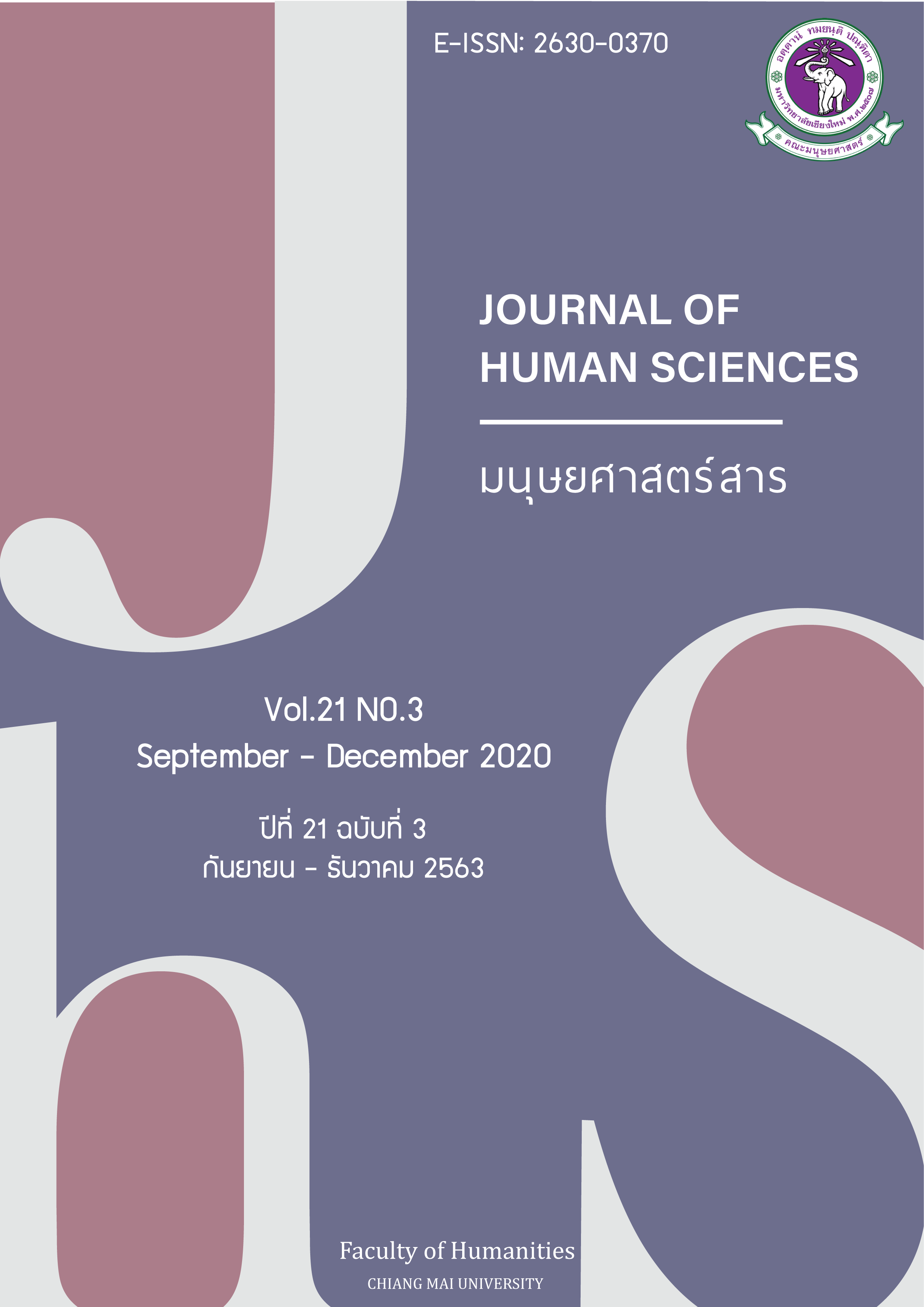การอพยพย้ายถิ่นและแรงงานความรู้สึกในเรื่องสั้น “The Embassy of Cambodia” ของเซดิ สมิธ และ บทละคร Model Citizens ของฮาริช ฌาร์มา
Main Article Content
บทคัดย่อ
บทความวิจัยนี้เป็นการศึกษาความสัมพันธ์เชื่อมโยงระหว่างการอพยพย้ายถิ่น, เพศสถานะ และแรงงานความรู้สึก ท่ามกลาง การเอารัดเอาเปรียบในโลกเสรีนิยมใหม่และจักรวรรดินิยมใหม่ และการควบคุมของรัฐ ในวรรณกรรมร่วมสมัยสองเรื่อง โดยเรื่องสั้น The Embassy of Cambodia (2013) ของ Zadie Smith ได้นำเสนอเรื่องราวชีวิตของ Fatou สาวรับใช้ต่างด้าวของครอบครัวเดอราวัลในย่านชานกรุงลอนดอน โดยได้สมิธได้เขียนถึง ตัวละครที่ทำงานบริการในลักษณะของแรงงานความรู้สึก ซึ่งมักถูกมองว่าเป็น “งานของผู้หญิง” โดยสมิธได้นำเสนอประเด็นสำคัญของโลกปัจจุบันและในประวัติศาสตร์ อาทิ ลัทธิการล่าอาณานิคม การฆ่าล้างเผ่าพันธุ์ การอพยพย้ายถิ่น และภาวะโลกาภิวัฒน์ ในขณะที่บทละคร Model Citizens (2012) ของ Haresh Sharma นำเสนอประเด็นแรงงานอพยพและภาวะพหุวัฒนธรรม ภายใต้การควบคุมของรัฐสิงคโปร์ ผ่านตัวละครหญิงสามคน คือ ภริยารัฐมนตรี, หญิงเชื้อสายเปอนารากัน และสาวใช้ชาวอินโดนีเซีย โดยบทละครของฌาร์มา เป็นการวิพากษ์แนวคิด “ความฝันแบบสิงคโปร์” ด้วยการตั้งคำถามว่า ใครคือพลเมืองตัวอย่างของรัฐสิงคโปร์กันแน่ และนำเสนอภาพแทนของแรงงานความรู้สึก ผ่านตัวละคร Melly สาวใช้ชาวอินโดนีเซีย บทความชิ้นนี้อ้างถึงแนวคิด ว่าด้วยแรงงานความรู้สึก และแรงงานอวัตถุ ของนักคิดสายมาร์กซิสต์และเฟมินิสต์ อาทิ Michael Hardt, Antonio Negri และ Silvia Federici ในการวิเคราะห์และอภิปรายการนำเสนอภาพแทน ของแรงงานความรู้สึกและแรงงานอพยพที่ทำงาน รับใช้ในบ้าน ในงานวรรณกรรมทั้งสองชิ้น และนำไปสู่ข้อสรุปที่ว่าเรื่องสั้นของสมิธและบทละครของฌาร์มา อาจชี้ให้เห็นหนทางที่จะนำไปสู่ความเป็นน้ำหนึ่งใจเดียวกัน ความเป็นพวกพ้อง และการปลดปล่อยแรงงานรับใช้ในบ้านเหล่านี้ จากการเอารัดเอาเปรียบในระบบทุนนิยม การควบคุมของรัฐ และแนวคิดชายเป็นใหญ่
Article Details
เอกสารอ้างอิง
Appadurai, A. (2000). Grassroots globalisation and the research imagination. Public culture, 12(1). 1-19.
Appiah, K. A. (2010). Cosmopolitanism: Ethics in a World of Strangers (Issues of Our Time). NY: W. W. Norton & Company.
Bolton, S.C. (2007). The lady vanishes: women’s work and affective labor. International Journal of Work Organisation and Emotion, 3(1). 1-9.
Bunsom, T. (2013). “Paradise Betrayed: Investigating the Plights of Female Domestic Workers in Two Contemporary Plays”. Journal of Liberal Arts. Ubon Ratchathani University. 10(2), 1-16.
Chua, BH. (2003). Multiculturalism in Singapore: an instrument of social control. Race & Class, 44(3). 58-77.
Federici, S. (2006). Precarious labor: A feminist viewpoint. Lecture. Retrieved from https://inthemiddleofthewhirlwind.wordpress.com/precarious-labor-a-feminist-viewpoint/.
Foucault, M. (1978). Histoire de la sexualite [History of Sexuality, Volume 1: An Introduction]. (R. Hurley, Trans.). NY: Pantheon.
Hardt, M. (1999). Affective labor. Boundary 2, 26(2). 89-100.
International Labour Organization. (2010). Report IV (1): Decent work for domestic workers. Retrieved from https://www.ilo.org/public/libdoc/ilo/2009/109B09_24_engl.pdf
International Labour Organization. (2013). Domestic Workers across the World: Global and Regional Statistics and the Extent of Legal Protection. Retrieved from https://www.ilo.org/wcmsp5/groups/public/---dgreports/---dcomm/---publ/documents/publication/wcms_173363.pdf
Jameson, F. (1991). Postmodernism or the Cultural Logic of Late Capitalism. London: Verso.
Lazzarato, M. (1996). Immaterial labour. Radical thought in Italy: A potential politics, 133-147.
Mackie, V., & Stevens, C. S. (2009). Globalisation and body politics. Asian studies review, 33(3). 257-273.
Negri, A., & Hardt, M. (1999). Value and affect. Boundary 2. 77-88.
Shapiro, M. J. (2014). War Crimes, Atrocity and Justice. NJ: John Wiley & Sons.
Sharma, H. (2012). Model Citizens. Singapore: Epigram Books.
Smith, Z. (2013). The Embassy of Cambodia. London: Hamish Hamilton.
Spivak, G. C. (1985). Scattered speculations on the question of value. Diacritics, 15(4). 73-93.
Tonkin, B. (2013, November 8). Book Review: The Embassy of Cambodia, by Zadie Smith. Retrieved from https://www.independent.co.uk/arts-entertainment/books/reviews/book-review-embassy-cambodia-zadie-smith-8927793.html
Weeks, K. 2007. Life within and against work: Affective labor, feminist critique, and post-Fordist politics. Ephemera: Theory and Politics in Organization, 7(1). 233-49.
Zapata, B. P. 2015. Decolonizing Trauma: A Study of Multidirectional Memory in Zadie Smith’s “The Embassy of Cambodia”. Humanities, 4(4). 523-534.


